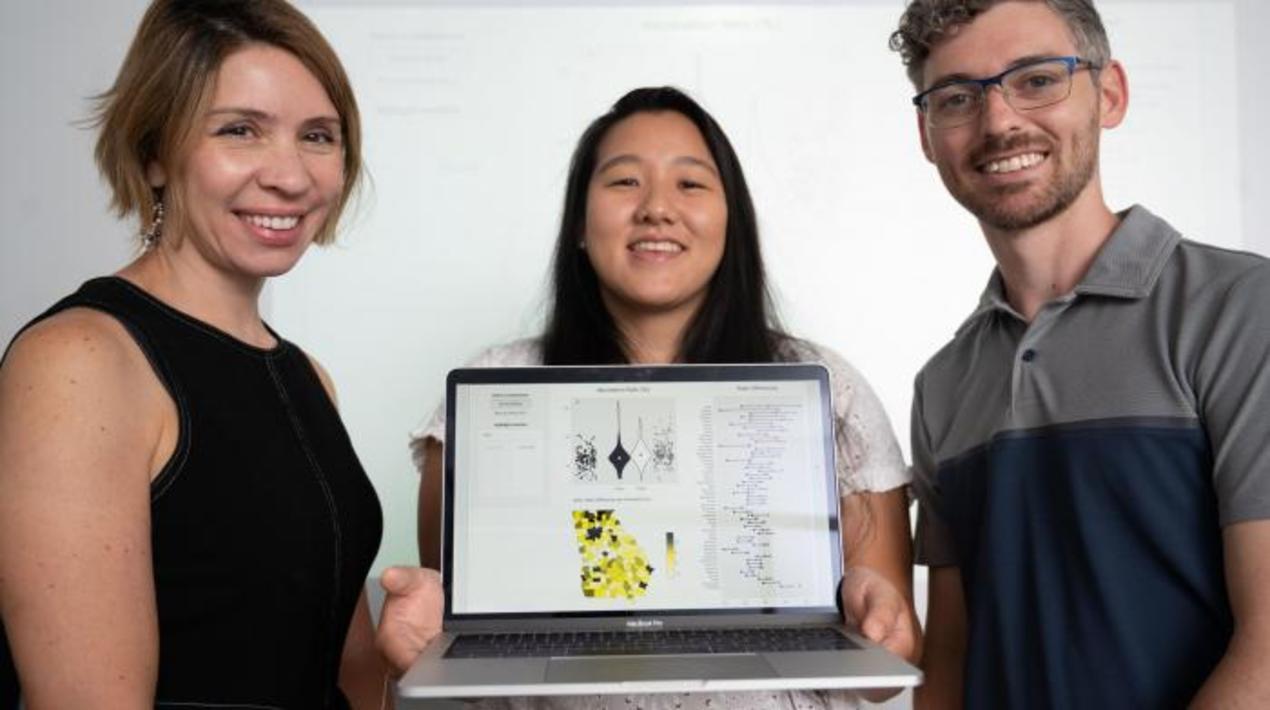
The U.S. continues to see COVID-19 vaccinations gradually increasing nationwide, with nearly 66% of all adults now having at least one vaccine dose according to the Centers for Disease Control and Prevention (CDC) COVID Data Tracker. However, disparities have been noted in vaccination rates across races and geographic areas. A new dashboard shows differences in vaccination rates by race across Georgia’s counties.
The COVID-19 Vaccine Dashboard displays vaccination rates by race and county, and the differences between white and black vaccination rates, for the entire population and for the 65+ age group in Georgia. The dashboard also has an interactive map as well as an interactive table, which allow users to compare and rank counties by vaccination rates, social vulnerability index, and other indicators of equity.
The dashboard indicated that vaccination rates among white residents are higher than those of Black residents in all large metro counties as well as around 70% of all Georgia counties. As there is a lot of variability in different regions of the state, the researchers wanted to take a closer look from an equity perspective.
The tech team was able to set up the dashboard, working closely with partners at the Georgia Department of Public Health (DPH). They shared early demos of the dashboard with both DPH and the Georgia Covid-19 Health Equity Council. The dashboard is critical to the job facing the public health community both in targeting areas and population segments in the state with low vaccine coverage rates and understanding broader trends.
The data contained within the vaccine equity dashboard are immensely important for Georgia. While figures like 70% to achieve herd immunity are often quoted, they are only meaningful if applied locally. Even if herd immunity targets are achieved nationally overall, where there are communities that have far lower coverage rates, the potential for virus transmission will persist. This dashboard will help to focus context-specific messaging programs and immunization campaigns so that we can close the doors on this pandemic
Vaccination dashboard results come as a new report shows vaccination coverage was lower among adults living in counties with the highest social vulnerability. According to the CDC, disparities in county-level vaccination coverage by social vulnerability have increased as vaccine eligibility has expanded, especially in large suburban and nonmetropolitan counties.
Vaccination coverage among adults was lower among those living in counties with lower socioeconomic status and with higher percentages of households with children, single parents, and persons with disabilities. The dashboard shows high vaccination rates across both racial groups in some counties, and low rates in those below the poverty level, compared with the national average.
Some counties currently have higher vaccination rates among white residents, including some of the large metro counties, while in a few counties the vaccination rate is higher among Black residents. The researchers acknowledge the multifaceted outreach efforts of health departments to increase vaccination rates across the state and hope that the dashboard will support these efforts.
The research team is updating the dashboard as new data becomes available and finalizing a manuscript summarizing the key findings. They also are actively collecting data from other states to integrate into the dashboard.
This initiative is aligned with a new report that found improving the use of data delivers better outcomes for residents, as reported by OpenGov Asia. Two key areas that have seen improvement are performance management and taking action, according to “Closing the Data Gap: How Cities Are Delivering Better Results for Residents. The report is based on a survey of 44 officials in the What Works Cities (WWC) network, an initiative to increase cities’ use of data.
Cities with crucial data skills and practices in place were able to pivot quickly to respond to the ever-evolving challenges the pandemic presented. The challenges include leaning on existing infrastructure, culture, and staff knowledge to immediately stand up crucial data command centres and public information dashboards in the early months of the pandemic and make critical decisions affecting public health, safety, and well-being. COVID-19 has illustrated the importance of investing in and building foundational data skills and practices that enable a city to respond quickly in the face of disaster.
















